Who was the original audience for the book of Genesis? Although we might be tempted to think we are, Genesis was written a long time ago in a different language and culture. Thinking through who the audience was, will help us approach the first chapter of Genesis on its own terms. In this episode, Will Barlow labors to put Genesis in its own context. He reminds us of what Israel had just been through in Egypt as well as other creation accounts from the ancient Near East. His goal is simply to contextualize Genesis within it’s own time and place in order to help us avoid anachronism.
Listen to this episode on Spotify or Apple Podcasts
See below for notes.
—— Links ——
- We are doing follow-up discussions to these episodes on YouTube. Check them out!
- See other episodes in this Scripture and Science Class
- Check out Barlow’s previous podcast episodes
- Learn more about and support the church Barlow and his team are starting in Louisville, KY, called Compass Christian Church
- Find more articles and audios by Barlow on his website: Study Driven Faith
- Support Restitutio by donating here
- Designate Restitutio as your charity of choice for Amazon purchases
- Join our Restitutio Facebook Group and follow Sean Finnegan on Twitter @RestitutioSF
- Leave a voice message via SpeakPipe with questions or comments and we may play them out on the air
- Intro music: Good Vibes by MBB Attribution-ShareAlike 3.0 Unported (CC BY-SA 3.0) Free Download / Stream: Music promoted by Audio Library.
- Who is Sean Finnegan? Read his bio here
—— Notes ——
What is our assumption about the Bible?
Background to Genesis
- Who wrote Genesis?
- Some say that it was a mixture of writers over a longer span of time
- I believe that Moses wrote Genesis (with the spirit of God guiding him)
How does this affect our reading of Genesis?
What was going on:
Exodus 1:8-10 Now there arose a new king over Egypt, who did not know Joseph. And he said to his people, “Behold, the people of Israel are too many and too mighty for us. Come, let us deal shrewdly with them, lest they multiply, and, if war breaks out, they join our enemies and fight against us and escape from the land.”
Exodus 3:1-2 Now Moses was keeping the flock of his father-in-law, Jethro, the priest of Midian, and he led his flock to the west side of the wilderness and came to Horeb, the mountain of God. And the angel of the LORD appeared to him in a flame of fire out of the midst of a bush. He looked, and behold, the bush was burning, yet it was not consumed.
Exodus 3:3-4 And Moses said, “I will turn aside to see this great sight, why the bush is not burned.” When the LORD saw that he turned aside to see, God called to him out of the bush, “Moses, Moses!” And he said, “Here I am.”
Exodus 3:5-6 Then he said, “Do not come near; take your sandals off your feet, for the place on which you are standing is holy ground.” And he said, “I am the God of your father, the God of Abraham, the God of Isaac, and the God of Jacob.” And Moses hid his face, for he was afraid to look at God.
Exodus 3:7-8 Then the LORD said, “I have surely seen the affliction of my people who are in Egypt and have heard their cry because of their taskmasters. I know their sufferings, and I have come down to deliver them out of the hand of the Egyptians and to bring them up out of that land to a good and broad land, a land flowing with milk and honey, to the place of the Canaanites, the Hittites, the Amorites, the Perizzites, the Hivites, and the Jebusites.
Exodus 3:9-10 And now, behold, the cry of the people of Israel has come to me, and I have also seen the oppression with which the Egyptians oppress them. Come, I will send you to Pharaoh that you may bring my people, the children of Israel, out of Egypt.”
Exodus 3:11-12 But Moses said to God, “Who am I that I should go to Pharaoh and bring the children of Israel out of Egypt?” He said, “But I will be with you, and this shall be the sign for you, that I have sent you: when you have brought the people out of Egypt, you shall serve God on this mountain.”
Exodus 3:13-14 Then Moses said to God, “If I come to the people of Israel and say to them, ‘The God of your fathers has sent me to you,’ and they ask me, ‘What is his name?’ what shall I say to them?” God said to Moses, “I AM WHO I AM.” And he said, “Say this to the people of Israel: ‘I AM has sent me to you.'”
Exodus 3:15-16 God also said to Moses, “Say this to the people of Israel: ‘The LORD, the God of your fathers, the God of Abraham, the God of Isaac, and the God of Jacob, has sent me to you.’ This is my name forever, and thus I am to be remembered throughout all generations. Go and gather the elders of Israel together and say to them, ‘The LORD, the God of your fathers, the God of Abraham, of Isaac, and of Jacob, has appeared to me, saying, “I have observed you and what has been done to you in Egypt,
Exodus 3:17 and I promise that I will bring you up out of the affliction of Egypt to the land of the Canaanites, the Hittites, the Amorites, the Perizzites, the Hivites, and the Jebusites, a land flowing with milk and honey.”‘
Exodus 17:3 But the people thirsted there for water, and the people grumbled against Moses and said, “Why did you bring us up out of Egypt, to kill us and our children and our livestock with thirst?”
Numbers 21:5 And the people spoke against God and against Moses, “Why have you brought us up out of Egypt to die in the wilderness? For there is no food and no water, and we loathe this worthless food.”
Who was the original audience of Genesis?
- The very people who grumbled and complained to Moses
- People who had a slave mentality (after generations of slavery in Egypt)
- People who were around idols in Egypt for centuries
Background on Genesis
“Genesis was written to the Israelites after they had lived in a land that worshiped many gods to remind them of who the one true God was—not to explain the science and details of creation.” (pg. 166)
Questions for Genesis to Answer
- Are we going to survive here in the desert? Are we safe here?
- Is there really only one God? What about all the Egyptian gods? Are they angry we left Egypt?
- Is this God who rescued us still here, or are we alone?
- What do we have to do to please this one God so we will have crops that won’t fail and have food for our families?
- Should we worship the sun? Should we worship the moon like the Egyptians? Or worship like the Canaanites, who are now nearby?
- Is the Egyptian story of how the world was made the true one? (pg. 168)
Contrasting Genesis 1
Contrasting Genesis 1 with the other creation accounts:
- Single God
- Creates by Himself using a word
- Creates humans with love and care
- Views humans as more than servants
Comparing Genesis 1
Comparing Genesis 1 with the other creation accounts:
- Similar view of a “flat Earth”
- Similar view of waters above and below
- Similar views of a solid dome above the Earth
When I say “Earth,” what comes to mind?

The Hebrews thought of this:

Questions we ask of Genesis 1
In our modern society, here are some questions that we ask of Genesis 1:
- How old is the Universe? How old is the Earth?
- How did plants live without the Sun for a few days?
- Where did the light come from if the Sun wasn’t there?

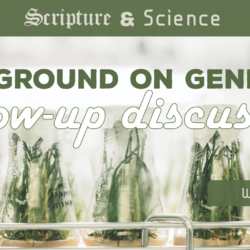

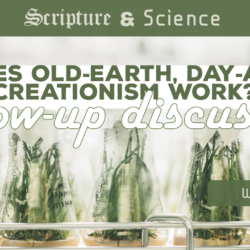
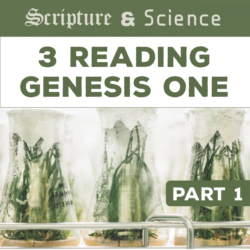
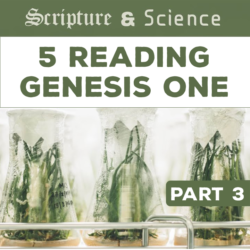
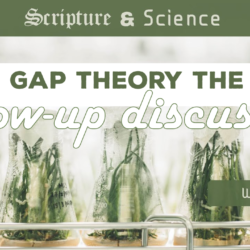
Good study and how I would answer the questions,
#1. nobody knows how old the universe is
#2. nobody knows how old the earth is
#3. plants can’t live with the sun so maybe it was there all along. I don’t see what else what make the first 3 of the nights and days.
#4. if there’s clouds in the sky we see light but not the sun itself. that makes sense to me.
The value of the Pentateuch is not reliant on complete Mosaic authorship, and the Pentateuchal text does not claim so.
That said, I thought the talk was well delivered, and there was a sister in the audience who had quite an appealing laugh.
For those interested in the position the Exodus event within secular histories, have a look at what the recent biblical and secular archaeology has to say. Check out the “Patterns of Evidence: Exodus” documentary. I have long been interested in history and aware of the anomalous unaccounted centuries gap in secular histories across many ancient world cultures. This documentary series provides some answers worth considering.
Questioning the Timeline of the Ancient World >>> https://youtu.be/seQuhoeyUVI
The full series & trailers here >>>
https://www.youtube.com/playlist?list=PLFANBfemmjMHfAo7nzPjUcCKtKjMUDwrX